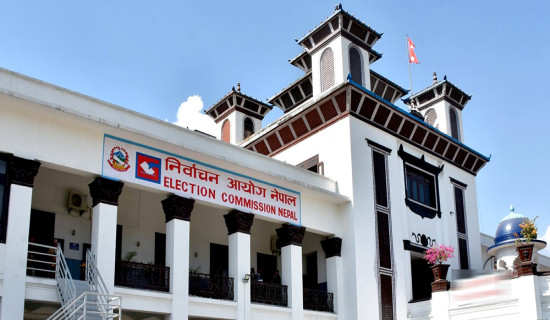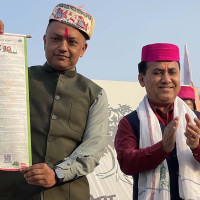- Thursday, 19 February 2026
Poor coordination in three levels of govt affecting development
By Modnath Dhakal,Lumbini, Nov. 11: The relations among the federal, provincial and local governments have not been functional as envisioned by the Constitution of Nepal even eight years after the implementation of federalism, said the representatives of the provincial and local governments of Lumbini Province.
Speaking at an interaction programme on the draft of the upcoming 16th Plan 2024/25-2028/29 organised by the National Planning Commission (NPC) in Lumbini on November 9 and 10, they said that the coordination among the three levels of the government have been poor and it has had detrimental impacts on their development policies and programmes.
While provincial and local governments are facing a shortage of resources and expertise in creating plans and development projects and executing them for the past six years since their establishment, the federal government has largely been apathetic to these concerns.
"We are not getting support from the federal government in the technical issues like formulating the periodic plan and creating the Mid-Term Expenditure Framework (MTEF)," said Bishnu Kumar Giri, President of the National Association of Rural Municipalities in Nepal (NARMIN)'s Lumbini Provincial Committee, and Chairperson of Gaumukhi Rural Municipality of Pyuthan district.
The provinces and local levels expressed ire against the change in policy and programmes along with the change in the government which was creating confusion among the implementing agencies, and sub-national governments were more affected by such practices.
However, Santosh Kumar Pandeya, Minister for Home Affairs of Lumbini Province, said that the sub-national governments should be stronger to make their plans happen. "There is a lacking on our part as well. We all are waiting for someone to come to us and implement miraculous development programmes," he said.
Meanwhile, most of the local body chiefs have a feeling that the federal and provincial governments failed to understand the needs of the local governments. For example, Lumbini Sanskritik Municipality has long been urging them to support it in waste management project but there has been no response, said Sajaruddin Khan, Mayor of Lumbini.
Local governments also have a feeling that there is no coordinating body to make strong workable partnerships among the three levels of the government.
According to many representatives, the NPC can function as that connection agency and provide technical support in devising local plans and budgetary activities.
Dr. Nahakul KC, Vice-Chairman of the Provincial Planning Commission of Lumbini, said that communication and interaction among the various levels of the government had become weak. It is important how the governments at various levels cooperate to include the issues of development that will benefit the grassroots level, he said.
The provinces also discriminate while allocating budget to the local levels, and the local bodies that are led by the leaders of the political parties other than the ones in the ruling do not get enough budget.
"It is ironical that the local governments that have a critical role in making any plan a success are seldom consulted and their capacity is enhanced in this regard. Federal and provincial governments should ensure that the benefits are leveraged to the local levels," said Chakrapani Aryal, Joint-Coordinator of Municipalities Association of Nepal (MuAN) of Lumbini Province, and Mayor of Banganga Municipality of Kapilvastu district.
Tika Ram Khadka, Deputy Mayor of Tulsipur Sub-Metropolitan City in Dang, voiced the same concerns. He said that poor implementation of policies and programmes had plagued national and local development.
According to him, until and unless fiscal federalism is promoted to the fullest, problems that exist at the local and provincial levels will not be resolved fully. Local government's suggestions on policies and planning are not taken seriously by the provincial and federal government, he said.
Samjhana Chaudhary, Deputy Mayor of Ramgram Municipality of Nawalparasi West, said that most of the plans and programmes have been the victim of poor or no implementation, and requested all the governments and agencies like the NPC to make the execution part more effective.
Mahesh Bhattarai, Joint Secretary at the NPC, said that the new national plan has to address the key challenges in the economy, meet the development aspiration of people and promote good governance by minimising corruption. Local bodies should also work to create their own project bank and implement them according to the local needs and priority, he suggested.
Dr. Ramesh Chandra Poudel, Member of the NPC, requested the sub-national governments to point out important plans or projects that have the potential to transform economic development of the province and local level but have long been missed from the national plans.
Expansion of informal economic activities has adversely impacted the revenue collection of all governments, so all of them should devise effective plans to formalise all business and activities he said.
The NPC is organising country-wide discussions, except Karnali Province due to the recent earthquake, with the stakeholders including the provincial and local governments, private sector, civil society to solicit input for the upcoming 16th Plan.
The planning body has conducted discussions with the provincial ministries, planning commissions, district coordination committees, local governments, private sector organisations, civil society, media and political parties in Lumbini Province.




-square-thumb.jpg)











